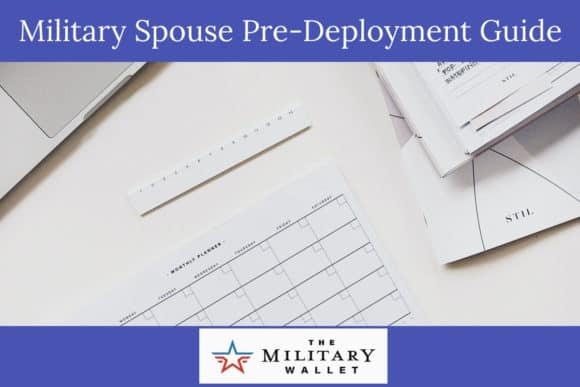Table of Contents
As a military spouse, you may have been through a wide variety of deployments — combat, non-combat, land or ship. Each one is different, yet they all have similar challenges. And the planning required for a single service member is different from one who has a family. Check out this military spouse pre-deployment guide to get prepared for the next deployment in your future.
Paperwork to Complete Pre-Deployment
When deployment approaches, you and your spouse will both have a lengthy to-do list. Some things absolutely need to be completed before the service member leaves the country to avoid financial or paperwork headaches later. During deployments, a military spouse often steps up to lead the entire household. Getting things in order before deployment will make things go more smoothly in your household.
Complete these Pre-Deployment Forms
Record of Emergency Data (RED) Form
Service members must complete a RED Form before deploying. It lists the contact info and benefit rights for the service member’s next of kin. It sounds straightforward, but people sometimes forget to update it after they get married or divorced. Make sure the right people will be contacted in case of injury or death.
Power of Attorney
A military spouse absolutely needs a power of attorney before a deployment. Even an unmarried service member should consider giving one to their parents. There are two different types.
- The general PoA allows the designated person to make decisions on your account and have access to your bank, so they can pay bills or update paperwork while you are gone.
- A specific PoA allows someone to sell your vehicle, buy a house in your name, or register your child into DEERS and Tricare (if a baby is born during deployment). A specific Power of Attorney will also allow a spouse to renew a military dependent ID card that expires during deployment.
You will need to get separate “specific” PoAs for each specific purpose. It is important to note that many PoAs expire after a year, so be sure it does not expire before the end of the deployment.
Wills
Both the service member and spouse should discuss and file a will before the deployment. This designates what will happen to your belongings and your children in case the worst happens during the deployment. It can also designate your intentions for medical resuscitation, known as a living will, and where you wish to be buried. It’s a difficult subject, but important to discuss with your spouse. You can each file a will for free with your installation’s Legal Office.
Family Care Plan
This important document designates emergency care for children in case the spouse at home is injured. In case of a car accident or hospitalization, it may take a few days to arrange for your family members to come to your house and take care of your children. The Family Care Plan names a local friend or neighbor who can temporarily care for them. Discuss your plans with the friend or neighbor first, and make sure they are listed on the school pick-up list.
Pet Care Plan
While not an official document, writing out this plan and keeping copies in your car or house will help someone take care of your pets in an emergency. Often these can be shared with a command representative or Family Readiness Group.
Bank Accounts
Both spouses need complete access to bank accounts. This is especially important during tax time or if a spouse needs to make a payment from an individual account. Banks do not always respect a Power of Attorney, so complete the forms directly from the bank in advance.
Make a Budget
Discuss deployment pay and variables. Set up allotments from the service member’s paycheck, if needed. Map out your household expenses, including the added costs of care packages and phone calling cards. Try to keep some money in savings for emergencies, since something is guaranteed to break during deployment. The following article covers how to manage money while on deployment.
Doctor Statement
This is useful for any special needs or medication of family members, especially when someone else is caring for them. Keep instructions for medicine and medical needs in your car and posted in your home, for someone to find in case of emergency.
The Usual Suspects – Copies of the Essential Documents
- Orders – are needed for taxes, breaking a lease or even changing a cellphone plan.
- Service member’s LES (Leave and Earnings Statement) – is needed to qualify for many benefit programs like WIC or free school lunches.
- Photocopies of personal data – driver’s licenses, social security cards, vehicle titles and registrations, birth certificates, marriage certificate, immunization records, passport or Visas and real estate deeds.
Keep all this information together and in a safe place.
Organize Information
- Contact info for the unit’s Family Readiness Group (FRG) and the American Red Cross.
- Phone numbers – Tricare, Base Legal office, and base family/community programs, emergency room, etc.
- Usernames and passwords for all bank accounts, credit cards, bill payments, subscription services and online registrations. To make this easier, you can use an online password manager and share access with your spouse.
- Emergency support – know who to contact for home maintenance, car trouble or medical situations.
- Phone numbers for family members on both sides of the family.
- Service member’s info, including deployment address, as well as their Social Security number, rank and command. This is needed for sending mail or Red Cross messages.
- Extra keys for the house and car so you can’t lock yourself out.
The Pre-Deployment Checklist that People Usually Forget
There are several checklist items that military families often forget. These are responsibilities that have nothing to do with the military and may not appear on a service member’s official checklist. However, they are just as important.
Car Maintenance
It is a running joke among military spouses that something always goes wrong with the car during deployment. But when it happens to you, it’s not a joke at all. Sometimes, common car troubles can be avoided with regular maintenance. Before deployment, you may think you are too busy to take care of these things. But it is better to do them before the deployment than to break down when you are on your own.
- Get an oil change for all vehicles, especially if you are going to put one in storage.
- Check tires for tread and tire pressure. Have them replaced or aligned if necessary.
- Get any replacement parts or maintenance that you have been “meaning to take care of.”
- Make sure your car insurance and registration documents are up-to-date and paid for the next few months. Copies should be kept in the vehicle.
- If your state requires a smog or other inspection before renewing the registration, schedule an appointment now.
- Discuss storage and maintenance options for the service member’s vehicle during deployment. If not being used, it should still be driven weekly to prevent tire damage and allowed to idle to charge the battery. If the vehicle is stick shift, make sure the spouse at home knows how to drive it.
Doctor Appointments
During a long deployment, family members will inevitably have to make trips to the doctor or dentist without the service member. However, you can make things a little easier by scheduling some of your routine check-ups now.
Tricare covers annual wellness check-ups for children, two dental visits per subscribed family member, and one eye exam. Annual exams from a dentist or optometrist can be done before the deployment when the service member is available to stay home with children. Will you or the service member need new contacts during the deployment? Schedule an eye exam now so you have an updated prescription. This makes ordering much easier.
If your children need to see a specialist, follow up with those leads now so you don’t forget about them in the busyness of deployment.
Bills and Finances
Right now, who manages the finances and schedules bill payments in your household? If it is the service member, remember that they may not have an internet connection throughout the deployment. The spouse should be aware of the family’s bills and be able to take over payment plans.
Note: One of the best things you can do is automate your finances to the extent possible. This can not only save you a lot of time, but it can dramatically improve your financial situation by helping ensure you consistently make all of your payments, consistently invest and you don’t miss any important deadlines. The following article can help you to automate your finances.
Here are additional financial considerations to think about before your spouse deploys.
Does the spouse’s name appear on all bank accounts?
If not, the service member should contact the bank or financial institution to have the spouse’s name added. Doing this during deployment is much more complicated because banks will ask a service member to scan, fax or notarize documents.
What about taxes?
If the service member will be deployed during the spring, the spouse may need to file taxes. Make sure they have access to the LES and all relevant documents. During a military deployment, the service member has the option to get an automatic extension past the tax deadline of April 15. The spouse only benefits from this extension if they are married and filing jointly.
Learn more about how military members can receive free tax return preparation and filing.
Change Your Phone Plans and Car Insurance
Typically, service members won’t have wireless phone service overseas and won’t be driving a car during deployment. This means that you can suspend their cell phone plan. Cellphone companies will require you to submit a copy of the deployment orders if they are under contract; be sure to redact any sensitive information before submitting a copy of the orders. You can also reduce the amount of data on your plan to save money.
To save more money, you can temporarily remove them as a driver on your car insurance plan. This should reduce the monthly cost of your insurance payments. You may even be able to significantly reduce the premiums on the service member’s car if it will not be driven while he or she is deployed. Ask your auto insurance provider about this and what will be required to reduce the rate on the unused vehicle.
Of course, discuss these money-saving options with your spouse first, and be prepared to reverse the changes at least a week or two before they return home.
Pre-Deployment Life Lessons for Military Spouses
Pre-deployment is a Roller Coaster
The easiest way to adjust to deployment is to keep busy and develop routines. Start a morning ritual that you look forward to. It can include coffee, a workout, watching a TV show, walking the dog — whatever gets you out of bed.
Try to schedule classes or hobbies that will occur on the same day each week. Make plans to meet up with friends on the weekends so you won’t be lonely. Give yourself something to look forward to each month, whether it is a night out with friends or ice cream with your kids. Having a scheduled structure to your lifestyle makes time pass more quickly.
Find Your Support Group
Friends make deployment more bearable. Some people find the best support from other military spouses in the unit. Other people feel more comfortable moving home and staying in touch with high school friends. There is no right or wrong answer. Do what works for you.
The universal truth is that no one has the time or energy for negativity during deployment. If there are certain ‘friends’ or family members who talk badly about your spouse, distance yourself from them. Do what you can to surround yourself with supportive people. They are the ones who will get you through the rough times.
There will Be Good Days and Bad Days
None of us are “super spouses” who can smile through a whole deployment. We all have days when we want to break down and cry. Even when deployment is going great and you feel like you have everything under control, emotions can get the best of you. Expect that you will sometimes have bad days. When that happens, slow down and take a break. Get some extra rest. It’s okay to really miss your spouse for no reason at all. It’s okay to cry. But don’t let the bad day turn into a bad week. Wake up the next morning with renewed energy and a stronger attitude.
No News is Good News
One of the hardest things about deployment is the lack of communication. Sometimes we have regular email and phone calls. Other times we don’t. When the unit is training, there may be a communication blackout for a few days. It’s easy to get frustrated and blame your spouse. Or worse, you worry that something terrible has happened.
But the truth is usually something boring and mundane:
The unit was training.
The ship’s internet went out.
He was too tired to wait in line for the phone.
If something truly went wrong, you would hear it on the news or receive a message from the unit. If you haven’t heard anything for a while, don’t assume the worst. It will just drain you.
We hope these tips will help you get through any deployment, whether it is your first or your 10th.




About the comments on this site:
These responses are not provided or commissioned by the bank advertiser. Responses have not been reviewed, approved or otherwise endorsed by the bank advertiser. It is not the bank advertiser’s responsibility to ensure all posts and/or questions are answered.